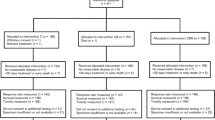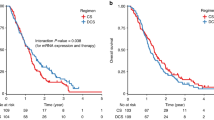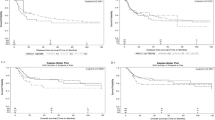Abstract
Recent studies have shown an association between the GNAS1 T393C polymorphism and clinical outcome for various solid tumors. In this study, we genotyped 51 patients from an observational trial on cisplatin/5-FU-based neoadjuvant radiochemotherapy of locally advanced esophageal cancer (cT2-4, Nx, M0) and genotyping was correlated with histomorphological tumor regression. The C-allele frequency in esophageal cancer patients was 0.49. Pearson's χ2-test showed a significant (P<0.05) association between tumor regression grades and T393C genotypes. Overall, 63% of the patients in the T-allele group (TT+CT) were minor responders with more than 10% residual vital tumor cells in resection specimens, whereas T(−) genotypes (CC) showed a major histopathological response with less than 10% residual vital tumor cells in 80%. The results support the role of the T393C polymorphism as a predictive molecular marker for tumor response to cisplatin/5-FU-based radiochemotherapy in esophageal cancer.
This is a preview of subscription content, access via your institution
Access options
Subscribe to this journal
Receive 6 print issues and online access
$259.00 per year
only $43.17 per issue
Buy this article
- Purchase on Springer Link
- Instant access to full article PDF
Prices may be subject to local taxes which are calculated during checkout


Similar content being viewed by others
References
Pisani P, Parkin DM, Ferlay J . Estimates of the worldwide mortality from eighteen major cancers in 1985. Implications for prevention and projections of future burden. Int J Cancer 1993; 55: 891–903.
Jemal A, Murray T, Samuels A, Ghafoor A, Ward E, Thun MJ . Cancer statistics, 2003. CA Cancer J Clin 2003; 53: 5–26.
Bollschweiler E, Wolfgarten E, Gutschow C, Holscher AH . Demographic variations in the rising incidence of esophageal adenocarcinoma in white males. Cancer 2001; 92: 549–555.
Devesa SS, Blot WJ, Fraumeni Jr JF . Changing patterns in the incidence of esophageal and gastric carcinoma in the United States. Cancer 1998; 83: 2049–2053.
Sherman CA, Turrisi AT, Wallace MB, Reed CE . Locally advanced esophageal cancer. Curr Treat Options Oncol 2002; 3: 475–485.
Kelsen DP . Multimodality therapy of esophageal cancer: an update. Cancer J 2000; 2: S177–S181.
Sherman CA, Turrisi AT, Wallace MB, Reed CE . Locally advanced esophageal cancer. Curr Treat Options Oncol 2002; 3: 475–485.
Prenzel KL, Konig A, Schneider PM, Schnickmann C, Baldus SE, Schroder W et al. Reduced incidence of nodal micrometastasis after major response to neoadjuvant chemoradiation in locally advanced esophageal cancer. Ann Surg Oncol 2007; 4: 954–959.
Schneider PM, Baldus SE, Metzger R, Kocher M, Bongartz R, Bollschweiler E et al. Histomorphologic tumor regression and lymph node metastases determine prognosis following neoadjuvant radiochemotherapy for esophageal cancer: implications for response classification. Ann Surg 2005; 242: 684–692.
Refaely Y, Krasna MJ . Multimodality therapy for esophageal cancer. Surg Clin North Am 2002; 82: 729–746.
Zacherl J, Sendler A, Stein HJ, Ott K, Feith M, Jakesz R et al. Current status of neoadjuvant therapy for adenocarcinoma of the distal esophagus. World J Surg 2003; 27: 1067–1074.
Medical Research Council Oesophageal Cancer Working Group. Surgical resection with or without preoperative chemotherapy in oesophageal cancer: a randomised controlled trial. Lancet 2002; 359: 1727–1733.
Urba SG, Orringer MB, Turrisi A, Iannettoni M, Forastiere A, Strawderman M . Randomized trial of preoperative chemoradiation versus surgery alone in patients with locoregional esophageal carcinoma. J Clin Oncol 2001; 19: 305–313.
Walsh TN, Noonan N, Hollywood D, Kelly A, Keeling N, Hennessy TP . A comparison of multimodal therapy and surgery for esophageal adenocarcinoma. N Engl J Med 1996; 335: 462–467.
Brucher BL, Stein HJ, Zimmermann F, Werner M, Sarbia M, Busch R et al. Responders benefit from neoadjuvant radiochemotherapy in esophageal squamous cell carcinoma: results of a prospective phase-II trial. Eur J Surg Oncol 2004; 30: 963–971.
Kelsen DP . Multimodality therapy of esophageal cancer: an update. Cancer J 2000; 6 (Suppl 2): S177–S181.
Warnecke-Eberz U, Metzger R, Miyazono F, Baldus SE, Neiss S, Brabender J et al. High specificity of quantitative excision repair cross-complementing 1 messenger RNA expression for prediction of minor histopathological response to neoadjuvant radiochemotherapy in esophageal cancer. Clin Cancer Res 2004; 10: 3794–3799.
Lenz HJ, Leichman CG, Danenberg KD, Danenberg PV, Groshen S, Cohen H et al. Thymidylate synthase mRNA level in adenocarcinoma of the stomach: a predictor for primary tumor response and overall survival. J Clin Oncol 1996; 14: 176–182.
Wu X, Gu J, Wu TT, Swisher SG, Liao Z, Correa AM et al. Genetic variations in radiation and chemotherapy drug action pathways predict clinical outcomes in esophageal cancer. J Clin Oncol 2006; 24: 3789–3798.
Koyama H, Bornfeldt KE, Fukumoto S, Nishizawa Y . Molecular pathways of cyclic nucleotide-induced inhibition of arterial smooth muscle cell proliferation. J Cell Phasiol 2001; 186: 1–10.
Lehnert S . Modification of postirradiation survival of mammalian cells by intracellular cyclic AMP. Radiat Res 1975; 62: 107–116.
Grunicke H, Hofmann J, Maly K, berall F, Posch L, Oberhuber H et al. The phospholipid- and calcium-dependent protein kinase as a target in tumor chemotherapy. Adv Enzyme Regul 1989; 28: 201–215.
Mann SC, Andrews PA, Howell SB . Modulation of cis-diamminedichloroplatinum(II) accumulation and sensitivity by forskolin and 3-isobutyl-1-methylxanthine in sensitive and resistant human ovarian carcinoma cells. Int J Cancer 1991; 48: 866–872.
Frey UH, Eisenhardt A, Lummen G, Rubben H, Jockel KH, Schmid KW et al. The T393C polymorphism of the G alpha s gene (GNAS1) is a novel prognostic marker in bladder cancer. Cancer Epidemiol Biomarkers Prev 2005; 14: 871–877.
Frey UH, Lummen G, Jager T, Jockel KH, Schmid KW, Rubben H et al. The GNAS1 T393C polymorphism predicts survival in patients with clear cell renal cell carcinoma. Clin Cancer Res 2006; 12: 759–763.
Frey UH, Alakus H, Wohlschlaeger J, Schmitz KJ, Winde G, van Calker HG et al. GNAS1 T393C polymorphism and survival in patients with sporadic colorectal cancer. Clin Cancer Res 2005; 11: 5071–5077.
Otterbach F, Callies R, Frey UH, Schmitz KJ, Wreczycki C, Kimmig R et al. The T393C polymorphism in the gene GNAS1 of G protein is associated with survival of patients with invasive breast carcinoma. Breast Cancer Res Treat 2007; 105: 311–317.
Schmitz KJ, Lang H, Frey UH, Sotiropoulos GC, Wohlschlaeger J, Reis H et al. GNAS1 T393C polymorphism is associated with clinical course in patients with intrahepatic cholangiocarcinoma. Neoplasia 2007; 9: 159–165.
Kaklamanos IG, Walker GR, Ferry K, Franceschi D, Livingstone AS . Neoadjuvant treatment for resectable cancer of the esophagus and the gastroesophageal junction: a meta-analysis of randomized clinical trials. Ann Surg Oncol 2003; 10: 754–761.
Urschel JD, Vasan H . A meta-analysis of randomized controlled trials that compared neoadjuvant chemoradiation and surgery to surgery alone for resectable esophageal cancer. Am J Surg 2003; 185: 538–543.
Xi H, Baldus SE, Warnecke-Eberz U, Brabender J, Neiss S, Metzger R et al. High cyclooxygenase-2 expression following neoadjuvant radiochemotherapy is associated with minor histopathologic response and poor prognosis in esophageal cancer. Clin Cancer Res 2005; 11: 8341–8347.
Yan L, Herrmann V, Hofer JK, Insel PA . Beta-adrenergic receptor/cAMP-mediated signaling and apoptosis of S49 lymphoma cells. Am J Physiol Cell Physiol 2000; 279: C1665–C1674.
Collins MT, Sarlis NJ, Merino MJ, Monroe J, Crawford SE, Krakoff JA et al. Thyroid carcinoma in the McCune-Albright syndrome: contributory role of activating Gs alpha mutations. J Clin Endocrinol Metab 2003; 88: 4413–4417.
Lyons J, Landis CA, Harsh G, Vallar L, Grunewald K, Feichtinger H et al. Two G protein oncogenes in human endocrine tumors. Science 1990; 249: 655–659.
Krumins AM, Barber R . Examination of the effects of increasing Gs protein on beta2-adrenergic receptor, Gs, and adenylyl cyclase interactions. Biochem Pharmacol 1997; 54: 61–72.
Yang X, Lee Sr FY, Wand GS . Increased expression of Gs(alpha) enhances activation of the adenylyl cyclise signal transduction cascade. Mol Endocrinol 1997; 11: 1053–1061.
Myklebust JH, Josefsen D, Blomhoff HK, Levy FO, Naderi S, Reed JC et al. Activation of the cAMP signaling pathway increases apoptosis in human B-precursor cells and is associated with downregulation of Mcl-1 expression. J Cell Physiol 1999; 180: 71–80.
Srivastava RK, Srivastave AR, Cho-Chung YS . Synergistic effects of 8-Cl-cAMP and retinoic acids in the inhibition of growth and induction of apoptosis in ovarian cancer cells: induction of retinoic acid receptor beta. Mol Cell Biochem 2000; 204: 1–9.
Kim SY, Seo M, Oh JM, Cho EA, Juhnn YS . Inhibition of gamma ray-induced apoptosis by stimulatory heterotrimeric GTP binding protein involves Bcl-xL down-regulation in SH-SY5Y human neuroblastoma cells. Exp Mol Med 2007; 39: 583–593.
Eichholtz-Wirth H, Hietel B . Cisplatin resistence in mouse fibrosarcoma cells after low-dose irradiation in vitro and in vivo. Br J Cancer 1994; 70: 579–584.
Adelstein DJ, Rice TW, Becker M, MA, TJ, A et al. Use of concurrent chemotherapy, accelerated fractionation radiation, and surgery for patients with esophageal carcinoma. Cancer 1997; 80: 1011–1020.
Fink U, Schuhmacher C, Stein HJ, Busch R, Feussner H, Dittler HJ et al. Preoperative chemotherapy for stage III-IV gastric carcinoma: feasibility, response and outcome after complete resection. Br J Surg 1995; 82: 1248–1252.
Langner K, Thomas M, Klinke F, Bosse U, Heinecke A, Muller KM et al. Neoadjuvant therapy in non-small cell lung cancer. Prognostic impact of “mediastinal downstaging”. Chirurg 2003; 74: 42–48.
Thomas M, Rube C, Semik M, von Eiff M, Freitag L, Macha HN et al. Impact of preoperative bimodality induction including twice-daily radiation on tumor regression and survival in stage III non-small-cell lung cancer. J Clin Oncol 1999; 17: 1185.
Junker K, Thomas M, Schulmann K, Klinke F, Bosse U, Müller KM . Tumor regression in non-small-cell lung cancer following neoadjuvant therapy. Histological assessment. J Cancer Res Clin Oncol 1997; 123: 469–477.
Baldus SE, Mönig SP, Schröder W, Metzger R, Lang S, Zirbes TK et al. Regression of oesophageal carcinomas after neoadjuvant radiochemotherapy: criteria of the histopathological evaluation. Pathologe 2004; 25: 421–427.
Acknowledgements
This study was supported by the Koeln Fortune Program and CIO/Faculty of Medicine, University of Cologne.
Author information
Authors and Affiliations
Corresponding author
Additional information
Duality of interest
None declared.
Rights and permissions
About this article
Cite this article
Alakus, H., Warnecke-Eberz, U., Bollschweiler, E. et al. GNAS1 T393C polymorphism is associated with histopathological response to neoadjuvant radiochemotherapy in esophageal cancer. Pharmacogenomics J 9, 202–207 (2009). https://doi.org/10.1038/tpj.2009.5
Received:
Revised:
Accepted:
Published:
Issue Date:
DOI: https://doi.org/10.1038/tpj.2009.5
Keywords
This article is cited by
-
Germline and somatic genetic predictors of pathological response in neoadjuvant settings of rectal and esophageal cancers: systematic review and meta-analysis
The Pharmacogenomics Journal (2016)
-
Long non-coding RNAs and cancer: a new frontier of translational research?
Oncogene (2012)
-
The GNAS1 T393C single nucleotide polymorphism predicts the natural postoperative course of complete resected esophageal cancer
Cellular Oncology (2011)
-
Neoadjuvante Therapie der Adenokarzinome des oberen Gastrointestinaltraktes
Der Chirurg (2009)



